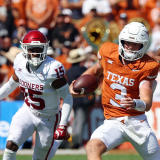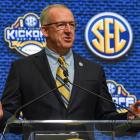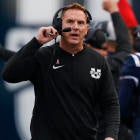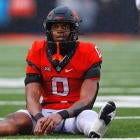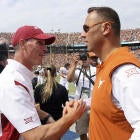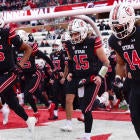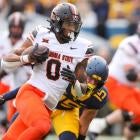Greg Sankey does not have time for hypotheticals. As the head of the most powerful college football conference in existence, his opinion is valued. But any "what if?" question these days is met with a stonewall of an answer from the SEC's commissioner.
"I gave them credit," Sankey said of a recent radio interview. "They very rarely said, 'If …'"
Like his FBS peers, Sankey is at the center of the return-to-play discussion for college football. Except he's in a leadership position. People notice what the SEC does because it is the most powerful conference.
"It's an interesting learning environment if you kind of open yourself up to having to adapt and accept that things will be different," Sankey said.
Part of that leadership: The league office already has reduced its expenditures by about 15%, freeing up $3 million to be distributed back to SEC members.
About to complete his fifth year as SEC commissioner, Sankey is facing the biggest challenge of his tenure. It hurts him to see athletes idled not knowing when they can return to play.
Just don't ask him when the football season is going to start. For now, the answer is obvious. Sankey and SEC are planning for an on-time start that features a full season as scheduled.
Whether that ultimately plays out, well, that remains to be seen.
CBS Sports sat down with the SEC commissioner this week for a question-and-answer session on that and numerous other topics. (The interview was edited for brevity.)
On Notre Dame athletic director Jack Swarbrick's belief that there's a "significant chance" conferences do not kick off together: "Everybody gets to have their opinions. It's a little early at this point to be making high-percentage presentations. Across the five [power] conferences, we're more connected than we've ever been. We've spoken every week day and some weekends certainly since March 10.
"You've seen back in March similar outcomes from independent entities [regarding conference basketball tournaments]. But we all came to the same conclusion. You've seen the same approach to ceasing athletic activities common through May 31.
"I know the desire -- because we're all connected in scheduling -- would be to have collective play resumed. … What state or local issues are in play as we move into the summer are going to provide that determination rather than early-May predictions."
On a possible interruption to the regular season by a spike in infections from the coronavirus: "I think it's important to communicate that we're focused on playing the season as scheduled. First, we want to make sure we're prepared. But if you have to adapt, you adapt off of that preparation. I also think it's important that young people who had the foundation of their education, the rhythm, the support right there … that's gone. It's important to communicate to them we're working on a daily basis to get back to operations. What does that look like? I know what I want it to be, but I can't predict on what it will be. I'm going to focus on that normal start-up. It may vary, but I can vary off of that plan rather than trying to have to play for all the problematic 'what ifs.'"
On the SEC's leadership role nationally in a return to play: "Playing football is important to us. [President Donald Trump] any number of times has remarked about his travels to our LSU-Alabama game last year. I think there is a great deal of focus, properly, on what the SEC does. That's why I think it's important to me to represent we're focused on playing football as scheduled.
"The circumstances around this virus will guide us. The importance of people paying attention to hygiene, the public health warnings, the distancing … All of that is important, but part of that is a communication to say were going to be prepared to get back to normal. We do believe we have a leadership in all of that work."
On whether he is heartened or concerned about some Southern states opening up: "I'm not an epidemiologist, an immunologist, a biostatistician or a researcher. I try to be careful about the information I consume because our campuses have such great health people to understand what's happening. We have 11 states [in the SEC], and there are different approaches in those 11 states."
On whether all 10 conferences need be aligned for the 2020 season to start: "The conferences have this history of making decisions and have made decisions that resulted in consistency. That is very much the clear desire and clear preference in this circumstance."
On how the coronavirus has impacted athletic budgets: "I have said repeatedly there's no place I'd rather be in this situation than the Southeastern Conference. I have repeated that on the presidential level. I've repeated that to coaches. I've repeated in department staff meetings. I've repeated that to athletics directors. What I know … we've adjusted our budget to reduce our expenditures at the conference office to right around 15% at this point.
"That intent is so that [we can send additional funds] out to our member institutions. We're going to do the same for next year, how we can operate at the highest level with an eye toward efficiency."
On whether the SEC Media Days will go on as scheduled in July (five conferences, including the Big 12, have already altered their plans to go virtual): "We're waiting as long as we can to figure out media days. If we can facilitate those conversations, that would be great. You saw everyone adjust around basketball tournaments. It wasn't a plan we all had. We had to have some ability to communicate with attention to the new viral dynamic.
"We think we can go later into May to see our reality. We've been contingency planning. And we wanted to see what happened with the NFL Draft, what learning experiences we could have."


